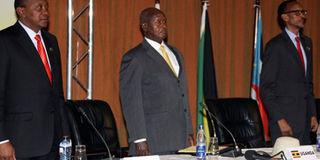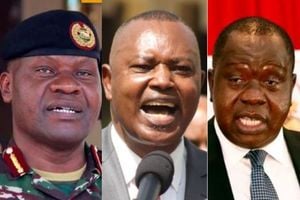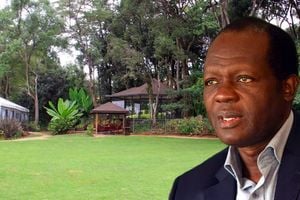Curbing illicit money outflows key to Africa’s progress

PHOTO | FILE Presidents Uhuru Kenyatta (Kenya), Yoweri Museveni (Uganda), Paul Kagame (Rwanda) and Dr Barnaba Marial Benjamin during the fourth Northern Corridor Integration Projects summit held at Munyonyo, Uganda in February 2014.
What you need to know:
- The impact of illicit outflows of capital in Africa was also the focus of the 3rd Tana High-Level Forum on Security in Africa held in the Ethiopian lakeside resort of Bahir Dar on April 26-27.
- The AU and the UN Economic Commission for Africa (Uneca) partner established a high-level panel of eminent persons headed by former President of South Africa, Thabo Mbeki, to address the issue. The panel’s report will be released during the next AU summit in June.
As Kenya’s power elite clash over whether to pay or not to pay the massive debts arising from contracts linked to the multi-billion-shilling Anglo Leasing scam, movers and shakers in the African Union are turning the spotlight on the impact of illicit financial flows out of Africa on security and efforts to pull millions of people from poverty.
Expectedly, if Parliament assents to the request by Treasury to approve payment of Sh1.4 billion to two firms – Universal Satspace Company and First Mercantile Securities Corporation – Kenya will move to a whole new level in the scourge of illicit financial outflows from Africa.
Ahead of its summit in June, the AU has elevated the stemming of illegal transfer of capital as a top priority.
The impact of illicit outflows of capital in Africa was also the focus of the 3rd Tana High-Level Forum on Security in Africa held in the Ethiopian lakeside resort of Bahir Dar on April 26-27.
This forum, styled along the Munich Conference on Security Policy, underlined illegal migration of money as a security threat and called for measures to curb the menace.
Attending the forum were presidents Omar al Bashir of Sudan, Salva Kiir of South Sudan, Abdiweli Mohammed Ali of Puntland-Somalia, Prime Minister Hailemariam Desalegn of Ethiopia, former presidents Olusegun Obasajo of Nigeria and Pierre Buyoya of Burundi, heads of regional and UN bodies, foreign envoys, as well as experts on security and finance.
Notably, the new focus on illegal transfers of funds reflects a seismic ideological shift from political liberation in the last five decades, to economic issues, particularly after the launch of the AU Agenda 2063.
The AU and the UN Economic Commission for Africa (Uneca) partner established a high-level panel of eminent persons headed by former President of South Africa, Thabo Mbeki, to address the issue. The panel’s report will be released during the next AU summit in June.
By all measures, the problem of illicit flow of monies from Africa is enormous. Between $1.2 trillion and $1.4 trillion was illicitly transferred out of Africa between 1980 and 2009. Even then, it is widely felt that these figures are underestimated. Speaking to the Tana Forum, President Abdiweli said that the “figures do not capture money lost through drug trafficking and the loss of Africa’s marine resources through illegal fishing”.
The causes of the outflows of capital are diverse and complex.
Some of the illicit funds have been generated from criminal activities, corruption, tax evasion, bribes and smuggling.
But as Prime Minister Desalegn averred, “the reality is that Africa is losing more through trade mispricing by multinational companies than through bribery and embezzlement.”
While bribery and embezzlement constitute just three per cent of illicit outflows, criminal activities such as drug trafficking and smuggling make up 30 to 35 pc of all illegal flows. The lion’s share of illicit outflow funds comes from commercial transactions involving multinational companies that make up a whopping 60 to 65 pc.
Africa’s fragile or failed states are main sources of illicit flows. In this regard, Executive Secretary of the Uneca, Dr Carlos Lopes, stresses that illegal outflows “threaten governance by undermining institutional resilience and weakening confidence, brewing cynicism in government”.
Weak states have turned Africa’s wealth of natural resources from “a golden avenue to economic growth” to a “curse” and source of conflict.
Africa’s fairly stable states are also not spared by haemorrhaging capital outflows. Over 57 pc of illicit financial flows have occurred in the mineral and extractive industries in West and Central African countries.
The top five states with the highest outflow measured include Nigeria ($89.5 billion), Egypt ($70.5 billion), Algeria ($25.7 billion), Morocco ($25 billion) and South Africa ($24.9 billion). As Kojo Busia, a mineral sector governance adviser at Uneca aptly observed, this has much to do with political discretion, which is too often accepted in mining negotiations.
With the discovery of oil, Kenya, Uganda and Ethiopia risk entering the list of top sources of illicit flows. The impact of outflows of capital is dire.
Research is challenging the traditional thinking that the West has channelled more aid money into Africa through foreign aid and other private-sector flows that it has received in return.
But studies are showing that capital migrating from Africa is nearly five times the continent’s current external debt, making it a net creditor to the rest of the world.
Flows have eaten into the gross domestic products of African countries, drained foreign exchange reserves, and reduced tax collection and inflows of investment.
Finally, illegal transfers of finances have widened income inequality and jeopardised job creation prospects.
Mbeki maintains that effectively addressing the causes of illicit outflows requires collaboration with the international community to ensure better transparency, tighter oversight of banks and offshore financial centres that absorb these flows.
DEVOTED LEADERSHIP
Second, tougher laws, stable institutions and responsible leadership are required to contain illegal outflows of money. Among these are financial intelligence units to curtail, track and repatriate these funds.
Under President Obasanjo’s leadership, Nigeria made big strides in repatriating some of the stolen funds, including recovering billions that former dictator Sani Abacha had hidden in banks abroad.
But as the former chairman of Nigeria’s Economic and Financial Crimes Commission Nuhu Ribadu warns, failure of continuity in leadership devoted to fight illegal money transfers has rolled back the gains made earlier in stemming these flows.
Eventually, triumph over illicit transfer of money will depend on the commitment of African leaders to stay the course.
Prof Kagwanja is the Chief Executive of the Africa Policy Institute. [email protected]





